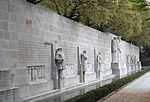ICVolunteers
ICVolunteers (ICVolontaires / ICVoluntarios) is an international non-profit organization (federation) active in the field of communications, in particular cybervolunteerism, languages and conference support. ICVolunteers works with volunteers to implement social and educational programs to help populations and local communities to develop. Through volunteer effort, it cooperates with organizations in the humanitarian, social, environmental and medical fields to implement projects and conferences at local, national and international levels. In addition, ICVolunteers promotes volunteerism and its recognition, by enhancing civic commitment and involvement, and by providing leadership and links between organizations, individuals, and communities. With its headquarters in Geneva (Switzerland), ICVolunteers has offices and permanent representation in a number of other countries, including France, South Africa, Mali, Spain, Brazil and Canada. Work of ICVolunteers began was in 1997.
Excerpt from the Wikipedia article ICVolunteers (License: CC BY-SA 3.0, Authors).ICVolunteers
Rue de Carouge, Geneva Plainpalais
Geographical coordinates (GPS) Address Nearby Places Show on map
Geographical coordinates (GPS)
| Latitude | Longitude |
|---|---|
| N 46.190083 ° | E 6.143332 ° |
Address
Rue de Carouge 104
1205 Geneva, Plainpalais
Geneva, Switzerland
Open on Google Maps







